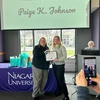Fredonia is making the Offender Workforce Development Specialist training program available to agencies and their personnel who help ex-offenders obtain stable employment upon release from jail or prison.
The university’s Department of Sociocultural and Justice Sciences has taken the lead role in conducting the training in recognition of the critical role that a positive employment experience plays in an ex-offender’s successful re-entry into the community. It also acknowledges the complex task various agencies face when assisting ex-offenders.
Each year, more than 700,000 inmates – including 20,000 in New York State – are released from state and federal prisons.
Delivered in three week-long sessions, the program consists of 104 hours of intensive classroom instruction in the Offender Workforce Development Specialist curriculum developed by the National Institute of Corrections. Training sessions scheduled in March, April and June are supplemented by 52 hours of practicum and homework assignments.
The curriculum includes National Career Development Association competencies in the following areas: assessment in career planning and job placement, career development theory and application, computers in career planning, barriers to employment, transition intervention for the offender population, job seeking/employability skills and job retention.
Instructors include Sociocultural and Criminal Justices Lecturer Patrick Johnson, representatives from the Chautauqua County Sheriff’s Office, Cattaraugus County Probation Department, Erie 2 Chautauqua Cattaraugus BOCES, Niagara County Probation, The Resource Center and a retiree of the Chautauqua County Department of Social Services.
The program, conducted at the Fredonia Technology Incubator, has been made available at no cost to corrections professionals, counselors, one-stop agencies, workforce investment staff, treatment service agencies, probation and parole offices, social workers and social service agencies that work in job placement, training and human services.
Upon completion of the program, participants become qualified facilitators who can enhance the capacity of their agencies to work with ex-offenders during re-entry. The skills sets they develop can also be applied at career training, planning and employment agencies. Those who complete the training are eligible for certification as a Global Career Development Facilitator, a nationally recognized designation.



